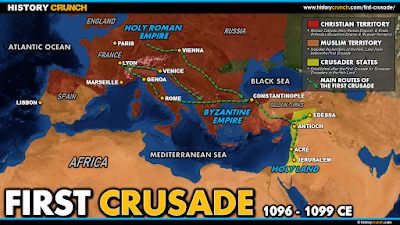Henry marched into Rome on 21 March 1084. Pope Gregory barricaded himself in the Castle Sant'Angelo, which meant abandoning the papal complex. Three days later, Clement III took possession of the papacy. In return, he crowned Henry as Holy Roman Emperor.
Gregory had allies, however, one of whom was the powerful King of Sicily, Robert Guiscard. Robert brought his Norman army to Gregory's aid, prompting Henry and Guibert to abandon Rome. On their way north, Henry ravaged parts of Tuscany which were possessions of Matilda of Tuscany, who had supported Gregory. Guibert went to Ravenna, where he had been archbishop, and wielded limited power.
Although Gregory was free to resume his job as pope, Romans were upset at damage done by his Norman allies. Opposition to Gregory grew great enough that he decided to live at Monte Cassino. He died a year later, on 25 May 1085. His immediate successor (Victor III) did not relish the public life of the papacy, and did not last long before he retired. His successor was Urban II, who also had problems because of German support (and some in Rome) for Clement. Clement returned to Rome in 1089, taking up residence at the Vatican and forcing Urban to stay away from Rome.
The King of France's brother, Hugh of Vermandois, marched on Rome to deal with the antipope, prompting Clement this time to flee to Monte Cassino. Hugh captured Monte Cassino as well, however, and Clement fled to Albano, a day's journey from Rome. By this time, however, Urban had died, and Paschal II was the pope of the anti-Germany faction.
Guibert/Clement died on 8 September 1100, having outlived two popes who were his opposition and who failed to depose him. His supporters elected another antipope, Theodoric, who never wielded any real authority and lasted a year.
Who was this Matilda of Tuscany, who supported Gregory and suffered because of Henry IV? Let me tell you about la Gran Contessa tomorrow.

